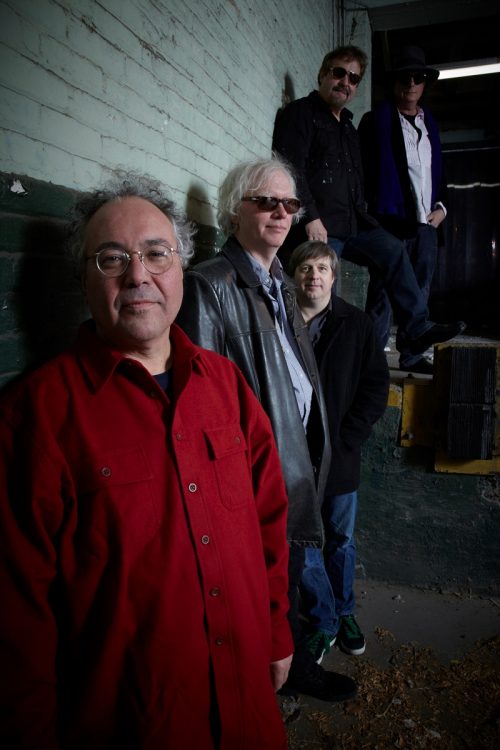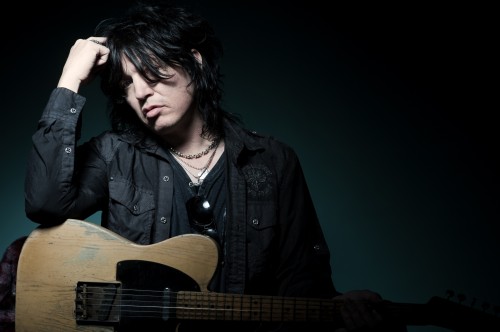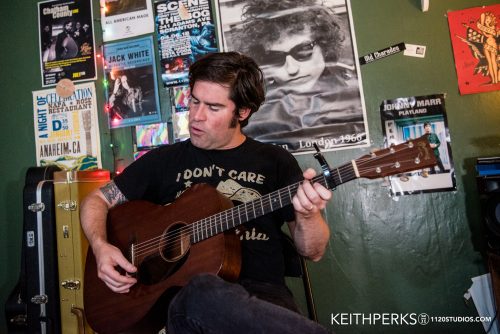Coming of age in Michigan in the early ’70s as Iggy and the Stooges pumped out the primal soundtrack, relocating to New York City in time to take in that city’s own brand of weirdness, and eventually becoming a licensed NYC tour guide, showing folks around environs including his beloved Coney Island, Kim Rancourt has amassed a few lifetimes’ worth of stories. Those tales, as well as the contributions from a band of luminaries, are the driving force behind “plum plum,” Rancourt’s solo debut album, released in May.
Rancourt, known for his work fronting the New York group When People Were Shorter and Lived Near the Water, and later The Shapir-O’Rama, connected with longtime friend and colleague, Don Fleming, the artist, producer, archivist and guitarist, who enlisted himself as well as drummer Steve Shelley (Sonic Youth), fellow guitarist Gary Lucas (Captain Beefheart, etc.) and bassist Joe Bouchard (Blue Oyster Cult) to flesh out Rancourt’s tunes on “plum plum.”
We recently chatted with Rancourt about the making of his debut record, working on a major Lou Reed archive project and his favorite New York songs.
How did “plum plum” come together?
Don and I were doing the Alan Lomax archive, and he said, “You just turned 60, you should do a solo record.” I said, “Yeah.” He put together not only my favorite record, but one of the best bands in New York right now. I gave Don a pile of my lyrics, which I did because Don likes my lyrics, and I like his too. He said, “We’ll get these people together.” So we went into Sonic Youth’s studio in Hoboken, and I told him what it should sound like, and they made it absolutely beyond my wildest dreams. What was in my head was what they played. I think it’s the best thing I’ve ever done, but it’s not me, it’s them.
Why do you feel it’s the best thing you’ve ever done?
We were in the studio for two days, doing 24 songs in a row. A lot of them were so brilliant I wish they could be released on 8-track or cassette or some rare format. When David Bowie died, I was here in New York. I loved him so much, and Lou Reed. The whole glitter thing hit in Detroit; there was a panic in Detroit, and it was real. I went from wearing OshKosh B’Gosh overalls to silver, satin pants. So David Bowie died, and we got into that last record [“Blackstar”], which I can’t listen to at all anymore, and he had only 10 songs. Don said if David Bowie’s last record had 10 songs, we should do 10 songs. He picked, I thought, the best 10 songs. And then Greg Calibi, the greatest masterer in the entire universe, mastered it. He’s an old friend of mine and Yankees fan for many years, I’ve known him since 1980 or something like that.
Why do you and Don Fleming work so well together?
We’ve worked on so many projects together. Last year, we were amazingly blessed — I don’t like to use that word, amazingly lucky — to archive the Lou Reed estate for Laurie Anderson. I worked on the Alan Lomax archive with him. We’re both working on a project of a very famous director’s archives.
We don’t have to say anything to each other, or we do (laughs). We’ve never had an argument; he’s yelled at me a few times, which I appreciate. It’s that we love each other, I think, and it’s been 30 years now. But more importantly, I’d have to say that I trust him entirely. I know what his taste is because of what he’s doing continuously with so many projects.
Continuing with Lou Reed, you were part of the big tribute to him at Lincoln Center last year.
Yes, I did the great show for Lou Reed and got to sing backup vocals for Joan As Police Woman, who I thought was fucking amazing, and sang backup for Jesse [Malin] and David Johansen. I had one of the most amazing experiences.
There’s also a connection between Lou and your beloved Coney Island.
When I listened back in the day to “Coney Island Baby,” it was like, OK, now I think it’s like the greatest record in the world. Him and Laurie were the king and queen of the Mermaid Parade. He was very sick at that time, and it was amazing that he consented to that. Recently we were going through the archives at Lincoln Center, where I’m employed, and it’s meant so much to me that this stuff is going on there. Marie Roberts, who is the last remaining, or one of the last remaining sideshow banner painters, we found the banners that she traditionally gives to the king and queen. It was funny, because we found three: Lou, Lolabelle their dog and Laurie.
You’ve now made your New York album. What are some of your favorite New York records?
Hmm (laughs). That’s a good question. “Autumn In New York” by Mel Torme (laughs). Anything by George Gershwin. “Coney Island Baby,” of course, and “New York” by Lou Reed. I’d have to say Bongwater was definitely New York and the whole Shimmy Disc thing. We were all in each other’s bands together so we would be able to play together. Definitely Kramer putting together the Shimmy Disc label.




Leave a Reply